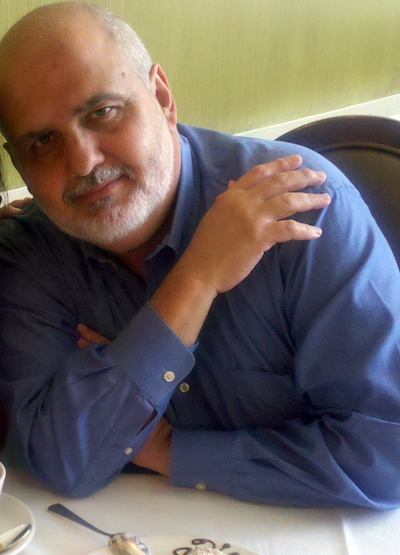I’m Bruce Nolan, a friend and colleague of Frank’s for nearly 40 years — which, New Orleans being New Orleans and Frank being Frank, is not as long as many of you have known him.
So let’s do the lede: Frank Donze was the best local political reporter of his generation.
Frank understood New Orleans politics because he understood the people who make it. And he understood those people because he understood the rhythms coming up through the sidewalks that those people listened to. There are reporters who are good, but never see the whole picture. Reporters who can get the story, but can’t write it. Reporters who can write beautifully, but don’t know what they’re writing about. And most frequently, there are reporters who write about the city and its people as they think they should be, not the way they are, really.
None of that with Frank.
There were no holes in Frank’s game.
Here’s the hardest thing in the reporter’s book: to write a story that is in some ways unflattering — that makes space for some enemy to give it to you, good — and then, to stay in touch tomorrow. To make clear that you’re playing by a set of rules that are the same for everybody. So that the next day, people still take your call.
Frank did that for years. In a universe that thrives on personal conflict, Frank Donze remained welcome on everybody’s turf.
Why? One, Frank could talk to a lamppost. Except in his case, as he approached, the lamppost would call him over and volunteer, “Say, Frank, did you hear this?” People were eager to share stuff with him. And they did. At all hours. At work. At home. Frank was never off the job.
Two, he got New Orleans, this city run by cousins, and brother-in-laws, and Nanans and Mameres, and bros, and my-mans.
He got that growing up in the Ninth Ward, and that grounded him all his professional life. He knew everybody. Knew their strengths, their ambitions, their styles, their prejudices and secret weaknesses.

Three, he knew that in local politics race, money, and relationships usually trumped ideas and slogans. He was ferociously attached to his principles, but in politics, he was a realist who would not be carried away by rookie enthusiasm. Some thought it cynical, but it made him a clear-eyed, honest reporter nearly immune to BS. Remarkably, it never made him bitter.
Four, there was that famous BS meter. Frank’s was hyper-tuned, not only on the street, but in the newsroom as well, where sometimes his meter would glow red hot and just about electrocute him.
We sometimes called Frank the shop steward. For Frank, management was to be endured as a price for doing what he loved. I should explain that every work morning all the editors would gather in a conference room for a half-hour news meeting. They’d decide on the next day’s line up of stories, then fan out into the open newsroom to distribute the assignments.
Frank called the editor’s meeting place "methane room." This was the place, he’d say, where formerly sensible human beings entered, breathed pumped-in methane or some other mind-destroying agent — and emerge stripped of all common sense.
Many’s the time Frank would watch an editor approach his desk, his face alight with the glow of what Frank suspected was a really stupid idea. Frank would rock back, fold his arms across his chest, cock his head and just wait for it — his whole posture saying, “What fresh hell is it today?” I know this because for a time I was one of those addled editors.
Frank did not suffer fools gladly. But he was fiercely loyal to his friends — and loudly critical when he thought they had been disrespected. One of the smartest women I know told me this week, and others agreed, that unlike most men, Frank saw the world chiefly in terms of personal relationships — and the women he worked with saw it immediately.
Yet the shop steward could be patient as well, especially with newcomers trying to learn New Orleans and its politics. He would be your guide around town. The guy you’d ask for help when a lede wouldn’t work. Try it this way, he’d say, and he’d knock out a few lines and the knot was cut. He was the least territorial reporter in the newsroom. He brimmed with information and was happy to pass it on to others.
His pod was the center of the newsroom. Reporters clustered around it like cowboys around a corral. His was the place to swap contacts. A marketplace of intelligence on city and neighborhood life. Who’s up; who’s down. Who’s got stroke; who’s the newcomer worth watching; what’s her story. He was the Buddha in the center of the circle.
Finally, Frank could be formidable. Never more so than at the end of his career. As the digital revolution approached, Frank became convinced that the future meant not only new reporting tools and techniques, but more deeply, new journalism practices that would not serve the city well. He would not go there. So after 35 years, he walked.
But he didn’t quit. He was such a natural that at his new job at the Audubon Institute, people still rang him to share gossip. People in power. People out of power. People at the edge of power. Lampposts still called him over. His network remained alive. And he called his old reporter friends and passed it on.
He went on down the Audubon zoo … and they all axed for you.
Yeah, they did. They did.
At the particular thing he did, he was the best I ever saw. He was an old-school newspaperman. A walking New Orleans library. A lovable badass. A patient mentor. A funny, crusty friend. And a helluva human being.
No BS — it was a privilege to have worked with him. God bless him.
RELATED ARTICLE: In memory of a local reporter who made small stories big
Editor's note: We asked Donze's colleagues to send along some of his most memorable stories. Here there are, explained by his colleague and most recent editor, Gordon Russell: "I tried to pick stories from the later part of his career, so they’d be posted online. Some of the bylines are a little funny … (but) these are all Frank Donze productions."
- Here’s one classic, not a political story but a chronicle of iconic places that had returned, or hadn’t, a couple of years after Katrina
- Classic yarn about a classic New Orleans rogue
- A story about the ignominious resignation of a City Councilman he knew well
- A related story – when Frank broke the Oliver Thomas story
Here is Donze's obit as it appeared in The Advocate.








